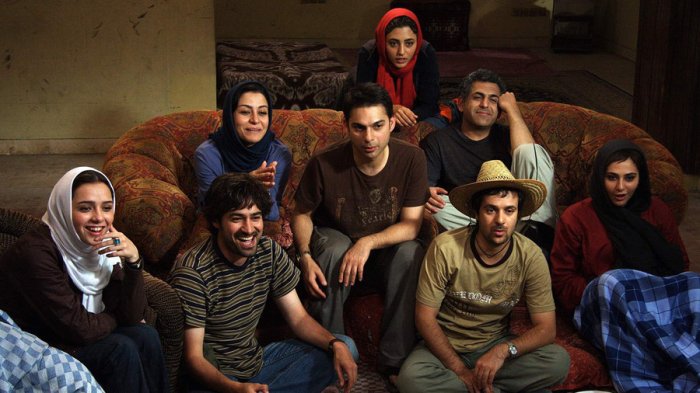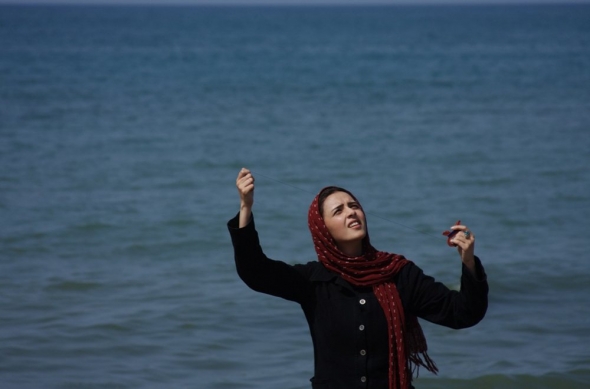Before the cerebral no win situations expertly constructed in The Past and A Separation, the Iranian director Asghar Farhadi first cut his teeth on the looser social thriller About Elly. Here you can see many of the ideas that fill his later films, like the nature of shifting perceptions and shifting culpability. Although it is less essential, About Elly is also a lighter film, showcasing the pressures of Iran’s Islamic society but also the way people live within it and have fun. His later films tend to be quite dour, in much the same way America’s late 90’s anti-suburbia films made it seem like anyone who owned their own house was a stubbed toe away from sobbing uncontrollably. About Elly, on the other hand, spends a large portion of the film acquainting us with Elly and the small group of friends she’s gone on holiday with before it throws her disappearance into the mix.
The film opens with the trip already in progress. A group of friends is traveling out to the coast to relax for a weekend. Most of them are old friends, but are each at different points in their lives. Some of them have children, some of them are childless, and some of them are single. The unpaired couple is made up of a freshly divorced Iranian ex-pat (“Better a bitter end, than endless bitterness”), and Elly, who sticks out as the only stranger in the group. She has been recruited by a busybody wife who is trying to play matchmaker over the holiday. In the wife’s mind, the best narrative for everyone is if this couple falls in love on the holiday and marries, cementing their place in future outings as a stabilized part of the group. The wife encourages the other couple’s to help play out this story, leading to conspiratorial coaxing to get the single man and Elly dancing and talking together. Elly demurely resists the obvious overtures. Soon, the narrative festers, and the group of friends begin to crack jokes and tease as if Elly is already betrothed. Elly is made extremely uncomfortable by this. The next day, while tasked with watching the young children on the beach, she suddenly disappears.
 |
| No that is not the Friends couch |
The rest of the film works to untangle what may have happened, sometimes fruitfully and sometimes into dead ends. But the social structure that defined the interactions before her disappearance also largely guides the discussion after she is gone. The heated arguments and lies that Elly’s disappearance bring out are another attempt at narrative control, and these discussions revolve around their opinions about the story and social implications rather than events. The most important thing is how her (death/disappearance/dalliance?) changes their relationships to each other and society, and the group’s focus is often admonishing each other for the steps that led to this point. This isn’t to suggest that the characters in About Elly are self centered or vapid, they’re actually quite intelligent and the discovery of a cell phone or a new fact leads them to quickly piece together the most rational and likely explanation. However most of the time they are powerless, marooned at the beach house without any shreds of evidence. Once real information dries up, the fallback is to control the narrative. A clean, rationale narrative is reality’s fake shadow, and control of its perspectives and motivations shifts where blame and nobility fall. Purifying real events into a simpler narrative is an unmistakable part of our psyche, perhaps explaining why we like stories in books and movies so much. About Elly discusses this need, and the need for narrative supremacy in a group, in the face of the hairier details of Elly’s disappearance.
 |
| Dangerous dames cookin some potatos |
Tonally, the film strongly resists winking at the audience or tipping its hand, a common hallmark of similar works. The excellent Certified Copy comes to mind, where a day trip dissolves into theoretical exercise. About Elly remains a real, grounded event. The skeleton of events is at times inscrutable but is always believable, and the end suggests a deterministic explanation if you are not paying attention. It might have been preferable to underline the themes, especially in the end (as in Farhadi’s The Past), but About Elly’s low key approach creates a more naturalistic air that suggests a conflict that is easier for the audience to relate to. Indeed, the narrative folding events of About Elly most strongly resemble Sarah Polly’s real life documentary Stories We Tell, which starts as a light hearted family affair and turns into a mystery where everyone is trying to assert their viewpoint.
 |
| I hope you will not be disappointed if I tell you everyone is not named Elly in the film |
About Elly is a realistic combination of social pressure and perspective control. Especially in a conservative society, the ability to control the narrative provides a crucial buffer between events and consequences. Even beyond just self protection, people seems to apply a definitive story to uncertain events subconsciously. This automatic action inadvertently hurts the wife’s position in the group or reveals a husband’s callousness. The brains in About Elly cannot rest in the face of a mystery, they cannot accept the ambiguity and instead default to any option, even when it is dramatic and terrible. While the events and conflicts of the film are basically mundane, the reactions and behaviors therein elevate About Elly to an interesting level.
Rating: 3/4
Originally published on Synthetic Error June 27, 2015

Comments
Post a Comment